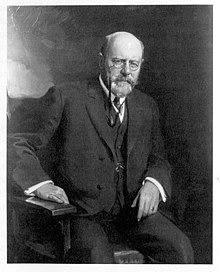Solon Spencer Beman
| Solon Spencer Beman | |
|---|---|
 |
|
| Born |
October 1, 1853 Brooklyn, New York |
| Died | April 23, 1914 (aged 60) Chicago, Illinois |
| Nationality | American |
| Occupation | Architect |
Solon Spencer Beman (October 1, 1853 – April 23, 1914) was an American architect based in Chicago, Illinois and best known as the architect of the planned Pullman community and adjacent Pullman Company factory complex. Several of his other largest commissions, including the Pullman Office Building, Pabst Building, and Grand Central Station in Chicago, have since been demolished. Beman designed numerous Christian Science churches and influenced the design of countless more.
Beman was born in the borough of Brooklyn in New York City, New York, to a father who was fascinated with architecture and who maintained an extensive collection of books on the subject. Encouraged by his father, in 1870 Beman began his architectural training at 17 in the office of New York architect Richard Upjohn, best known for his religious designs in the Gothic Revival style. While with Upjohn, Beman helped design the Connecticut State Capitol, and eventually became sufficiently accomplished to be named an associate designer. In 1877, Beman left Upjohn to begin his own practice.
In 1879, Beman received a commission from George Pullman to design what would become the nation's first planned company town, and he relocated to Chicago to carry out the extensive work involved. Pullman arranged for Beman to design the many buildings involved, while landscape architect Nathan Franklin Barrett created the street and park system. Located south of Chicago on the shore of Lake Calumet (in what would become Chicago's Far South Side), the company town of Pullman included more than 1,300 houses, a factory, monumental water tower, theater, church, hotel, market, and schools but the town of Pullman soon became controversial. Celebrated for orderliness and planning at first, Pullman's reputation soured when the Pullman Palace Car Company refused to lower town prices or rents for workers after cutting their wages, touching off the bitter national Pullman Strike. Ultimately the courts forced Pullman to relinquish the town, it was annexed by Chicago, and is now an Illinois state historic site.
...
Wikipedia
